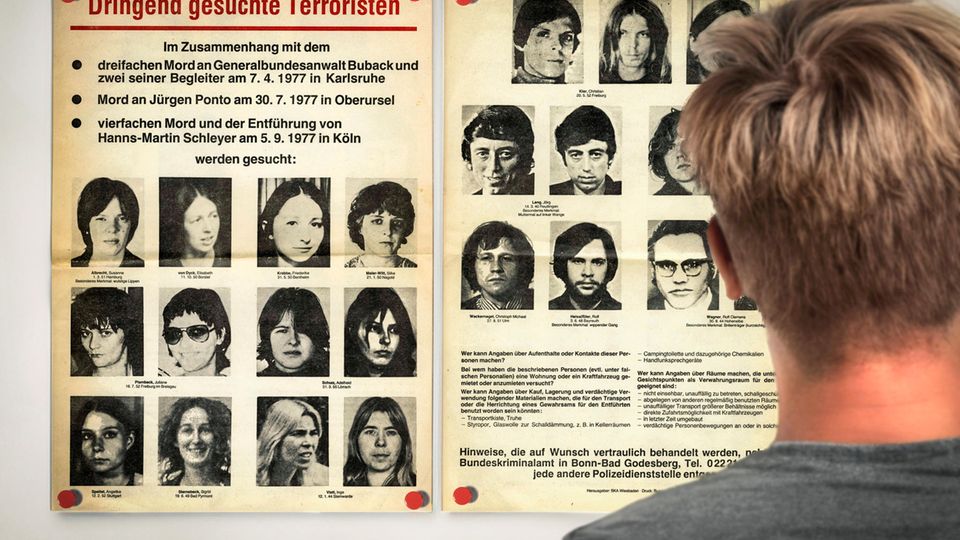Michael Buback lost his father in an RAF assassination attempt. Here, the son of Federal Prosecutor General Siegfried Buback, who was murdered in 1977, tells us how he experiences the current manhunt involving Daniele Klette and her accomplices, what memories he has of the day his father was killed – and how he once happened to meet an RAF terrorist at the train station met.
Did you think it was possible that the investigators could still track down the RAF terrorist Daniela Klette after more than 30 years of fruitless searching?
My guess was that the three former terrorists we were looking for were mostly abroad. The fact that Ms. Klette lived unrecognized in Germany for decades is surprising to me. This circumstance will now certainly be investigated. Still, there were some persistent investigators who eventually succeeded.
A Canadian journalist had found Burdock months ago using facial recognition software – and it only took 30 minutes. Do you still have confidence in the work of the German security authorities? Even after the experiences you had in connection with the investigation into your father’s murder?
I don’t know whether the Canadian journalist managed to hit it by chance. However, if a targeted search actually only takes 30 minutes, one has to be seriously concerned about the quality of German investigations. There are already such concerns in connection with the 34 murders attributed to the RAF, of which only that of the then CEO of Dresdner Bank, Jürgen Ponto, has been fully clarified. However, the victim’s wife witnessed the crime. The perpetrators were therefore known without any special involvement of investigators.
Do you think that Klette is now “clearing the air” and opening up about the internal structures of the RAF, perhaps even helping to clarify the crimes? Maybe even to solve your father’s murder?
I fear that she will not do that, but that she will probably follow the example of other former terrorists and neither incriminate herself nor others or provide any information about the internal structure of the RAF. She may have no knowledge of the murder of my father and his companions.
After Klette’s arrest, it became clear that the topics of the RAF, the “German Autumn” and left-wing terrorism still have a strong impact on people; they have apparently always remained present in the collective subconscious. Did that surprise you?
If you experienced the time when there was a danger that the RAF would cause the Federal Republic of Germany great hardship, it is astonishing how little public interest is devoted to this complex. After Ms. Klette’s arrest, interest has flared up again, but it remains to be seen how long the new involvement with the RAF will last. Actually, the fact that almost all RAF murders remain unsolved should become a permanent issue. But that’s not how it is. My wife and I read the book “The General Must Go!” about the Karlsruhe attack. written in which the very interesting trial against Verena Becker is described. However, the book is largely ignored by the mainstream media and it does not reach the subconscious.
They criticize the fact that of the 34 murders attributed to the RAF, only one has been fully solved to date. That would mean: numerous perpetrators who killed people and destroyed families still live unmolested, perhaps even among us. How do you feel about this thought?
This is a very unpleasant thought that also shakes my sense of justice. It is a duty of the constitutional state to investigate crimes, especially when they are committed by terrorists from whom the state wants to protect itself and its citizens.
Red Army Fraction
30 years of left-wing terror – the chronicle of the RAF in Germany
Even today – more than 45 years after the assassination attempt on your father – it is not clear who exactly fired the fatal shots. Are you still hoping that this murder can be solved beyond a reasonable doubt?
My wife and I have now gained a very clear picture of the Karlsruhe attackers, which fully meets our needs. Unfortunately, the official clarification is still pending. We now know that the real perpetrators of the murders will remain permanently unpunished and, on the other hand, that those sentenced to life in prison for the Karlsruhe crime were not at the crime scene. These are very bitter findings, as is the fact that there was cooperation between the Office for the Protection of the Constitution and a terrorist. This led to us co-plaintiffs being involved in an almost absurd main trial against the RAF terrorist Verena Becker, in which a woman who, as a secret informant for the Office for the Protection of the Constitution, was undoubtedly provided with protection promises, was indicted by another state agency, the Federal Prosecutor’s Office, as a Karlsruhe accomplice. Such processes do not lead to clarification.
How do you remember the day your father was murdered?
I went skiing in Zermatt during the Easter holidays with my wife, who taught at a high school in Karlsruhe. There my wife received the news from her father. She told me about my father’s murder when I returned to the hotel that evening and still didn’t know anything. It was a very difficult task for her.
Were you afraid for your father before? Did they realize how vulnerable he was?
When I was still a child, I was afraid for my father, who was entrusted with state security cases for almost his entire professional life, even as a public prosecutor in Lüneburg. The zone border wasn’t far and I feared that the Stasi might do something against him. Later, I was so busy at work that I barely had time for anxious thoughts. My father also always gave us the impression of confidence and calmness.
Do you actually know why they were so negligent back then to let your father drive to his place of work in Karlsruhe in a non-armored car without an accompanying vehicle, without personal protection?
I don’t know that. This is undoubtedly a misjudgment on the part of those responsible for protection. What is certain is that my father was in the highest risk category and that experts had to determine and implement the measures to protect him. This was by no means my father’s job. As the relevant police service regulations state, requests not to accept the prescribed protection were even to be rejected. We were therefore hurt that the responsible Interior Minister of Baden-Württemberg gave the impression after the attack that my father had not accepted protection, which is wrong. Protection had to be guaranteed and not requested by request.
Daniela Klette belonged to the so-called third generation of the RAF. This killed with cold, almost surgical precision. This part of the RAF is often accused of only being interested in naked murder, without any political motivation. How do you feel about this point of view?
It is to be hoped that these aspects can be clarified in Ms Klette’s interviews, as there are quite different views on the third generation. Some even have doubts about their existence or cannot imagine that RAF members were able to act with such high technical precision.
You have repeatedly criticized the fact that former RAF terrorists almost never showed empathy or compassion for the victims’ families. Why do you think it is so difficult for these people to say, “I took your father away from you, please forgive me”?
This question would be better asked of RAF perpetrators. I can only imagine that because of the agitation at the time and the close environment of like-minded people, people thought they were committing justified acts of violence. It will then be difficult later to view these crimes as serious injustice, as one would then condemn particular actions in one’s own life and deprive one’s life story of a viable basis.
Some former members of the RAF say: “I don’t want to talk about my time in the RAF anymore. I have a new life now.” How does that affect you?
I can understand that, because some people are probably ashamed of what they have done. But I think it would be better to share the knowledge that is important for investigators and also for the victims’ relatives.
One of the few exceptions was Peter-Jürgen Boock, one of the key players in the so-called “German Autumn”. Boock has contacted you. How did this contact go? Did Boock simply call you by phone? And how do you remember the conversations with him?
In 2007, Boock heard my desire to find out which of the perpetrators we had named shot my father. He called us several times to tell me what he knew, but he couldn’t reach me because I was a visiting professor in New Zealand. After I returned, he was the first to tell me that those convicted of the Karlsruhe attack were not the real perpetrators. At first I couldn’t and didn’t want to believe this news, which was absolutely outrageous to me. But then it turned out to be true. It turned out that the real Karlsruhe perpetrators were never in prison for a day for the murders and that they can never be convicted for them again because of the “Ne bis in idem” rule*.
Assume that Daniela Klette, who has now been arrested, would be willing to talk to you. Would you respond to that?
I would certainly do that, especially if Ms. Klette can provide information about the Karlsruhe attack. During the Stuttgart trial, I even offered to speak to Ms. Becker when I met her by chance at the Stuttgart train station. But she didn’t accept the offer.
What would you expect from her?
First and foremost, of course, information about the Karlsruhe attack, but also other information about the RAF phenomenon, about which so much is still obscure. It would be even more important that Ms. Klette would give the responsible investigators relevant information about the RAF.
*) Legal principle according to which no one may be tried twice for the same crime
To person: Michael Buback (79) is the son of the former Federal Prosecutor General Siegfried Buback, who was killed by the Red Army Faction (RAF) in an assassination attempt in Karlsruhe in April 1977. Buback fought for years to get the details of his father’s murder cleared up. Who actually fired the fatal shots is still unknown today. Christian Klar, Knut Folkerts and Brigitte Mohnhaupt were convicted, but it is still uncertain whether they were really the perpetrators. Michael Buback and his wife Elisabeth wrote a book about his meticulous search for the real perpetrators, entitled: “The General Must Go.”



